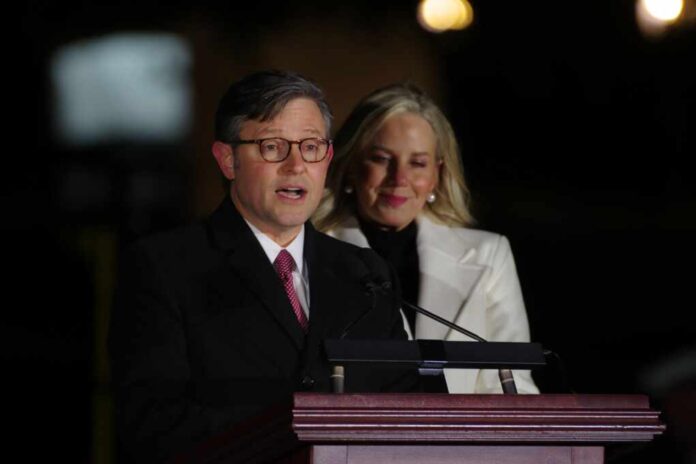
In a move allegedly agreed to in order to avert a government shutdown, congressional leaders on Sunday announced a spending deal for fiscal year 2024, setting the government’s discretionary spending at $1.59 trillion. This agreement, mirroring last year’s bipartisan budget pact, marks a critical juncture in the nation’s fiscal management.
House Speaker Mike Johnson (R-LA) played a pivotal role in the negotiations, securing a deal with Senate Democrats and White House officials. Johnson’s letter to colleagues pointed to the agreement’s respect for the Fiscal Responsibility Act (FRA), with $886 billion allocated for defense and $704 billion for nondefense spending. Johnson tried to put a favorable spin on the massive spending deal by emphasizing that it represents a $30 billion reduction from the Senate’s initial proposal and includes cuts to the IRS and COVID-era funding.
🚨 BREAKING: CONGRESS REACHES TOP LINE DEAL TO AVERT GOVERNMENT SHUTDOWN
After all the arguments, posturing, and credit downgrades… a bipartisan proposal has been reached on $1.59 Trillion of spending in 2024.
This is a whopping savings of… $16 Billion
Also, the one area… pic.twitter.com/xvlFp3NO4x
— Dr Danish (@operationdanish) January 8, 2024
Senate Majority Leader Chuck Schumer (D-NY) and House Minority Leader Hakeem Jeffries (D-NY) predictably hailed the agreement for preserving vital domestic priorities and rejecting “draconian cuts sought by right-wing extremists.”
Joe Biden also eagerly endorsed the new spending framework, underscoring its reflection of “bipartisan negotiations” and its protection of programs he said are “crucial to hardworking Americans.”
However, this bipartisan effort has not been met with universal acclaim within Republican ranks. The House Freedom Caucus blasted the deal as a “total failure,” critiquing the obscured programmatic spending level of $1.658 trillion, contrary to the publicly announced $1.59 trillion. They accused Johnson of resorting to “Washington math” and failing to deliver on the promises of fiscal restraint that led to the fragile GOP majority in the House.
Rep. Matt Rosendale (R-MT) described the latest spending agreement as a “D.C. cartel spending deal” and criticized Johnson for allowing Democrats to make only “microscopic concessions.”
The tension within the GOP is palpable. While Johnson acknowledges the deal’s limitations, noting that it won’t satisfy everyone and doesn’t cut as much as desired, he defends it as a “step forward” in the budget process.
The critical federal elections this fall will tell the tale of whether America First voters are satisfied with the work done by House Republican leadership to carry out the mandate they were given in 2022. As the party struggles to find its identity and offer conservatives a strong voice in Washington, the campaign strategies offered by establishment Republicans are in danger of once again falling short of the mark.














